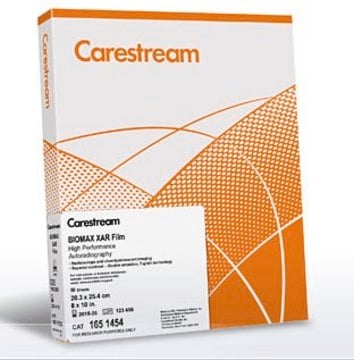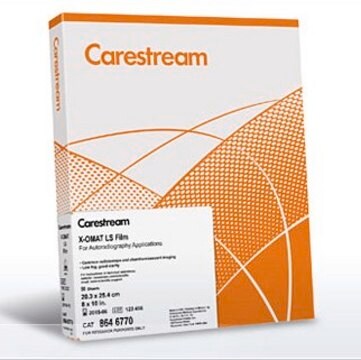F5763
Carestream® BioMax® XAR Film
Synonym(s):
autoradiography film, xray film
Sign Into View Organizational & Contract Pricing
All Photos(1)
About This Item
UNSPSC Code:
41105341
NACRES:
NB.22
Recommended Products
size
8 in. (20 cm) × 10 in. (25 cm)
Looking for similar products? Visit Product Comparison Guide
General description
Each sheet of film is sealed in a light-tight envelope. With high-energy emitters, the film may be exposed directly through the envelope without the use of exposure cassettes or holders.
- Coated with emulsion on both sides of the clear base.
- Recommended for chemiluminescence.
- Very versatile for autoradiography with high or low energy isotopes.
- Sensitivity can be increased with intensifying screens when using low-energy isotopes.
- When handling film in a darkroom, Kodak LED Safelight Darkroom Illuminator is recommended.
- All the XAR films are the same, just packaged differently.
Footnote
Kodak X-OMAT AR film was reformulated to become BioMax XAR film.
Legal Information
BioMax is a registered trademark of Carestream Health, Inc.
Carestream is a registered trademark of Carestream Health, Inc.
Kodak is a registered trademark of Eastman Kodak Company
Choose from one of the most recent versions:
Certificates of Analysis (COA)
Lot/Batch Number
Sorry, we don't have COAs for this product available online at this time.
If you need assistance, please contact Customer Support.
Already Own This Product?
Find documentation for the products that you have recently purchased in the Document Library.
Pietro Fratta et al.
The EMBO journal, 37(11) (2018-05-17)
TDP-43 (encoded by the gene TARDBP) is an RNA binding protein central to the pathogenesis of amyotrophic lateral sclerosis (ALS). However, how TARDBP mutations trigger pathogenesis remains unknown. Here, we use novel mouse mutants carrying point mutations in endogenous Tardbp
Gabriela Andrejeva et al.
Autophagy, 16(6), 1044-1060 (2019-09-14)
Macroautophagy/autophagy can enable cancer cells to withstand cellular stress and maintain bioenergetic homeostasis by sequestering cellular components into newly formed double-membrane vesicles destined for lysosomal degradation, potentially affecting the efficacy of anti-cancer treatments. Using 13C-labeled choline and 13C-magnetic resonance spectroscopy
Eri Takeda et al.
PloS one, 6(11), e27815-e27815 (2011-11-24)
Vpr, an accessory protein of human immunodeficiency virus type 1, is a multifunctional protein that plays an important role in viral replication. We have previously shown that the region between residues 17 and 74 of Vpr (Vpr(N17C74)) contained a bona
Articles
Background and protocols describing the various methods used by molecular biologists to detect samples of protein or nucleic acids bound to membranes.
Our team of scientists has experience in all areas of research including Life Science, Material Science, Chemical Synthesis, Chromatography, Analytical and many others.
Contact Technical Service








